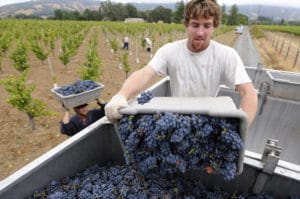Denver Post
By Claire Martin
Want to get fitter and smarter during a vacation, and save money on food and lodging? Try WWOOFing.

Many adventurous travelers familiar with WWOOF — Worldwide Opportunities on Organic Farms — know it as a network pairing volunteers with organic farmers throughout the world. In exchange for labor, volunteers get free (or sharply discounted) board and lodging.
But you don’t need a passport to go WWOOFing. You don’t even need to leave Colorado.
Colorado has nearly 60 WWOOF farms and ranches. They range from the bizarrely urban — a WWOOF affiliate that cultivates former lawns and yards in southeast Denver; another that abuts I-25 in Douglas County— to traditionally idyllic sites.
Getting a list of WWOOF farms means paying $30 to join the USA WWOOF chapter, an annual membership that buys access to organic farms in all 50 states. Most WWOOF hosts prefer WWOOFers interested in spending at least one week (some hosts have a one-month minimum).
The farms vary as much as their settings. Some WWOOF affiliates emphasize spiritual connections with the land. Some farmers underscore educating WWOOFers about water-efficient gardening, animal husbandry and lunar cycle farming.
Most WWOOFing accommodations are spartan: Bring your own tent and sleeping bag. Others are more comfortable, with furnished private bedrooms and bathrooms.
An upside: the food. Meals typically feature produce that WWOOFers harvested earlier that day. Many WWOOF affiliates also offer Community Supported Agriculture shares to nearby towns, and some supply organic produce and other food to upscale restaurants.
“There are people paying very good money to eat our beyond-organic food in Carbondale and Aspen,” says Brook LeVan of Sustainable Settings, a WWOOF farm near Carbondale.
“Each day, we sit down to whatever’s coming out of the fields and freezers, the henhouse and the dairy.”
Experience isn’t required, but a readiness to learn and take on tasks is essential. As Dwight Steyn, who operates WWOOF affiliate CircleF8 Ranch, put it, “Most of our volunteers don’t have an agricultural background, so they bring a fresh perspective on things. I like challenging the belief of what they can and can’t do.”
He likes introducing WWOOFers to new agriculture concepts. For example, hugelkultur, a type of raised-bed garden. A hugelkultur bed uses a buried foundation of decomposing wood that retains water and emits heat, fostering healthy crops in the topsoil covering the wood. Steyn has several hugelkultur beds that WWOOFers cultivate and supplement with castings harvested from the farm’s worm bins.
LeVan of Sustainable Settings says, “We’re looking for people who are alert and have a good sense of how their brain connects to their fingertips.
“We’re a little different. We’re not purely a ranch, but a learning center for whole-system thinking, and general sustainability from energy to food. The folks who come here want to understand the renewable energy side, the agriculture side, and the green building side.”
The labor expected of WWOOF volunteers varies. At CircleF8, Steyn allows WWOOFers to decide whether they prefer to concentrate on animal husbandry — learning how to feed and manage goats and chickens, and their products — or focus on water-efficient gardening that finds ways to repurpose materials.
Steyn keeps what he calls a “furniture garden,” with vegetables and herbs planted in serving dishes and ceramic cups, and herbs in the drawers of an old wood desk that overlooks a busy stretch of I-25.
At Sustainable Settings, WWOOFers learn about permaculture and polyculture — mixed plantings with perennials, trees and shrubs to attract beneficial insects. WWOOFers attend afternoon lectures, and go on field trips to seed banks.
WWOOFer Charlotte Robert, a Belgian who volunteered at Sustainable Settings last fall, never imagined becoming midwife to a cow and a newborn calf. But that’s what happened.
“I helped the baby to find the udders, and to taste her first milk!” Robert recalled.
“For us, this birth was the symbol of Sustainable Settings: Happiness, delight in the strength and the beauty of nature. Our stay was a wonderful human and spiritual encounter, more than a simple learning of the agricultural life.”
Be prepared for the darker side of agricultural life, too. Robert also helped slaughter 80 hens during her month on the farm.
“First, I didn’t feel good with this idea of killing somebody,” she said.
“But in the same time, I thought that it was great to kill the hens at the same place where they grew, and the hens seemed very calm until they died. This is the real life.”
Claire Martin: 303-954-1477, [email protected] or twitter.com/byclairemartin
WWOOF in Colorado
Redefine “staycation” by volunteering for a week or more at an organic farm or ranch in Colorado, honing your skills in gardening and animal husbandry and dining on the fruits of your labors: woofusa.org
WWOOF began in rural England in 1971 as Working Weekends on Organic Farms. Today, there are WWOOF-affiliated farms and ranches in Africa, Europe, Asia-Pacific, and North and South America.
For a list of Colorado WWOOF-affiliated farms and ranches, you need to join the USA WWOOF chapter. The $30 fee buys access to all WWOOF host farms and ranches in the USA.
WWOOF questions to ask before you volunteer on the farm
Ask the hosts how many hours per day they expect volunteers to work, and if volunteers also work on weekends.
Ask about facilities: sleeping, showering/bathing, toilet and laundry.
Ask the host to evaluate the hands-on labor on a 1:10 scale, with 1 representing help selling vegetables at a farmer’s market, and 10 representing lugging 25-pound bags up and down steep hills.
What are volunteers are expected to bring? The host generally provides tools, but volunteers may be expected to provide their own boots and gloves, etc. Some WWOOF farms offer only tent camping, and volunteers may need to bring their own tent and other camping gear.
Know that WWOOF volunteers assume responsibility for all risks. WWOOF encourages volunteers to buy travel insurance or temporary medical insurance that will cover emergencies.
Claire Martin

